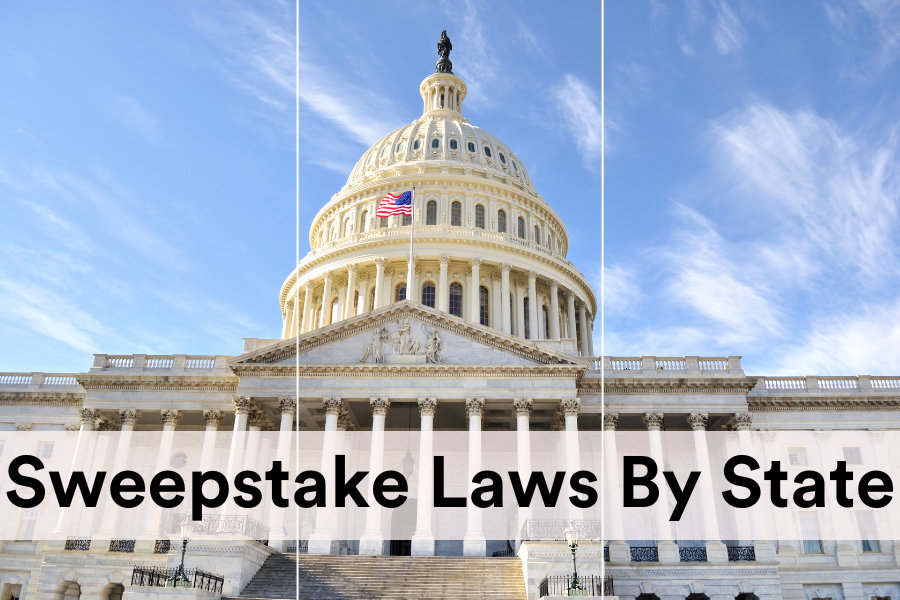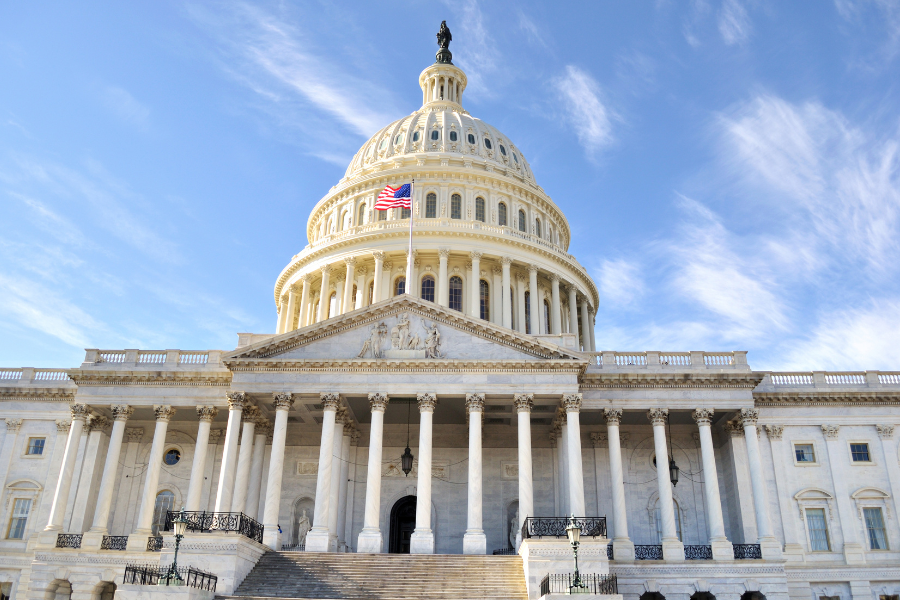Planning on holding a sweepstake? Being familiar with the law will come in handy. In this post we’ll take a look at sweepstake laws by state to get you familiar and ready to create the sweepstakes of your dreams.
This post is all about sweepstake laws by state, providing you everything you need to know.

A sweepstake is a type of contest where a prize or prizes have a probability of being awarded to a winner or winners. They first began as a form of lottery which was given to winners. They were always tied to the products sold. The FCC and FTC refined U.S. broadcasting laws and the sweepstake laws by state(creating the anti-lottery laws) which we’ll talk about later in this blogpost.
Because of their potential for abuse, sweepstakes are heavily regulated in many countries. The US, Canada, and individual US states all have laws covering sweepstakes, so there are special rules depending on where the entrant lives.
In Australia, a sweepstake is known as a competition, however the technical name for a consumer competition is a trade promotion lottery.
Most sweepstakes in the UK are small-scale. They are usually classified as work lotteries, residents’ lotteries, or private society lotteries. They do not require a licence, provided that all the money staked is paid out as prize money.
In the United States, sweepstake sponsors are very careful to disassociate themselves from any suggestion that players must pay to enter, or pay to win, since this would constitute gambling.
WHAT ARE SWEEPSTAKE LAWS IN THE US

Sweepstakes laws in the US are designed to ensure that promotions are conducted fairly and ethically, protecting consumers from fraud and deceptive practices. These laws govern various aspects of sweepstakes, including eligibility requirements, prize disclosures, entry methods, and more. It’s essential for businesses to comply with these laws to avoid legal repercussions and maintain their reputation.
There are state and federal regulations that must be complied with in order to run a lawful sweepstakes. Here are some fundamental rules that regulate sweepstakes:
The official rules must typically contain the following information:
- A no purchase is necessary: To enter a sweepstake, it is not necessary to have made a previous purchase of the goods and services the organization offering the sweepstake normally offers.
- Start and end dates: All sweepstakes must have a specific start and end date. On that end date, the winner must be chosen.
- Eligibility requirements: All eligibility requirements must be spelled out.
- Method to enter: The method to enter must also be well stated.
- Limitations on the number of person by household
- Odds of winning: The odds for entering depends on the points of entry. For each sweepstake, it should already be well specified.
- Description and value of the prize: What the prize will be should be emphasized on.
- How the winner(s) will be selected
- Restrictions on receiving the prize
- Void jurisdictions: Sweepstakes are prohibited in some areas known as void jurisdictions. It is compulsory to know if sweepstakes are prohibited in your location.
- Sponsor’s name and address: The sponsor’s name and address needs also to be clearly stated.
WHAT ARE SWEEPSTAKES LAWS BY STATE IN THE USA
Sweepstakes in the USA are promotional events where participants have the chance to win prizes based on chance, without having to pay anything to enter. Unlike contests where skill is required to win, sweepstakes winners are chosen randomly. To distinguish sweepstakes from lotteries, which are illegal unless conducted by the state, no purchase or payment should be required to enter a legitimate sweepstake. So far there’s a prize and a chance, a sweepstake is legal in the USA. In the USA, there are two major rules:
- No purchase of products is required: This is just like it’s been explained earlier. You don’t need to have bought their products before you can win prizes from a sweepstake.
- Taxes must be paid on prizes
Also in the USA, here are some things you should know about sweepstakes:
Text to Win sweepstakes are legal in all 50 states including the District of Columbia.
There are some called call-to-action statements (i.e., Text SWEEPSTAKE to 65019 for a chance to win [prize description]) should follow with warning that says: “Text message and data rates may apply.”
That is, there must be a disclaimer.
Sweepstakes and Contest Abbreviated Rules statements should be included in all printed and digital marketing materials. The Entry Page for The Sweepstakes (i.e the page where participants enter contact information) should contain the following statement:
“You are providing signature, consent and agreement to receive marketing text (SMS) messages from the sponsor of this promotion. Message and data rates may apply. Reply STOP to end at any time. 4msgs/mo. max. Text HELP for help. Privacy Policy (url). Terms of Use (url). Official Rules (url). It is legal for anyone who is 18 years of age or older to take part in a giveaway. However, the phrase “online” introduces additional complexities because it refers to everyone with internet access. There are laws in some areas that must be followed. In Canada, for example, choosing a winner must involve some level of skill and cannot be done at random.
Furthermore, if you decide to let Canadians take part in your promotion, you will either need to completely omit Quebec or incorporate the regulations that the province mandates. Your promotion can end up remaining more regional as a consequence. Make sure you’re meeting all the requirements in those areas for anybody you decide to target with the giveaway.
HOW DO YOU KNOW IF A SWEEPSTAKES IS LEGIT?

If you are ever told that to receive your prize, you must pay, then you are dealing with a scammer.
If someone requests payment for “taxes,” “shipping and handling charges,” or “processing fees” in order for you to receive your prize, this is also a sign that they’re not legit. Don’t pay with gift cards, cryptocurrency, wire transfers, or cash payments to claim your prize. These payments are used by scammers because it’s difficult to figure out who received the money.
IF it’s said that paying improves your chances of winning. That is only the action of a scammer.
A legit sweepstake law even by state does not require you having to pay to get prizes.
If you are told that you must provide your financial details, it’s also fake. Definitely not legit at all. Giving out your credit card number or bank account information is never necessary in order to enter a sweepstakes or receive a prize. Don’t provide this information if they ask for it. It’s a fraud.
Thieves attempt to appear legitimate. They want you to believe that you have won a lottery or sweepstakes run by the government. They may assume they are from a legitimate organization like the Federal Trade Commission or invent fictitious names like the “National Sweepstakes Bureau.” In actuality, you won’t receive a call from the government demanding money before you can claim your award.
Con artists create the impression that you are the lone recipient of their award. However, numerous recipients received the identical SMS, email, or letter. In case your mail arrived via mail, make sure to verify the postmark on the postcard or envelope. Your “notice” may have been received by many others if it was mailed at a bulk rate. For other kinds of messages, see whether anyone else has reported receiving the same message online.
SWEEPSTAKES EXAMPLES
To help you understand the range of sweepstakes, consider the following examples:
Product launches: A tech business may hold a lottery where participants can win a brand-new smartphone. This generates interest in the product and gets people talking about it before it ever hits the shelves.
Travel Adventures: A travel company might run a lottery to award a sumptuous tropical all-inclusive trip. This encourages consumers to fantasize about traveling and might even lead to future reservations with the agency.
Social Media Engagement: An apparel company may hold an Instagram contest. Follow the brand’s account, like the sweepstakes post, and tag a friend in order to enter. Both follower count and brand awareness rise as a result.
User-Generated Content: A drink manufacturer might hold a contest in which competitors upload a picture or a video of themselves sipping the beverage. As a result, user-generated material is produced, which the business can market.
In-Store Purchases: A chain of supermarkets may collaborate with a food company to run a contest. Consumers can enter if they purchase a specific quantity of the brand’s goods. This incentivizes consumers to make larger purchases and increases brand sales.
Loyalty Programs: As a benefit for regular travelers, an airline may grant entry into sweepstakes. This encourages more use of the airline and rewards devoted patrons.
Skill-Based Sweepstakes: In contrast to conventional sweepstakes, in which winners are selected at random, participants in skill-based sweepstakes must accomplish a task or exhibit a skill in order to be eligible to win. A cooking or photo competition, for instance, would be classified as a skill-based sweepstakes.
Non-Profit Sweepstakes: In order to collect money for their causes, non-profit groups occasionally hold sweepstakes. A vacation or experience could be awarded as the prize, or it could be a donation made in the winner’s honor to a charity.
GIVEAWAY RULES FOR INSTAGRAM AND ENSURING LEGITIMACY

Social media platforms like Instagram have become popular channels for hosting sweepstakes and giveaways. However, specific regulations apply to these promotions, including disclosure requirements and prohibited actions. To ensure the legitimacy of your Instagram giveaway, make sure to clearly communicate the rules, eligibility criteria, and prize details to participants, and always comply with platform guidelines.
SWEEPSTAKES VERSUS CONTEST
A legit sweepstake comprises prize and chances while a contest comprises prize and consideration.
What does this Consideration mean?
Consideration is a legal term. It means an undertaking in response to a promise.
There are two types of consideration in general.
They are:
- Monetary consideration
- Non-monetary consideration
Monetary as the name implies is typically the payment of money, such as the purchase of a product or a service or the direct payment of an entry fee. Non-monetary consideration is an entrant’s expenditure of considerable time or effort. The giveaway rules template consists of the entrant’s effort.
CONCLUSION
Sweepstakes or online giveaways are a great way to get audience engagement, expansion and sales growth. However, it must be carefully planned to comply with local laws and to prevent entrant fraud and abuse.
The world of sweepstakes and sweepstakes laws by state can be thrilling, with chances to win amazing gifts. But keep in mind that every state has a different legal system before you dive in. Understanding the main distinctions between sweepstakes laws can help you make sure your participation or promotion complies with the rules.
Hopefully, this blog piece has given you more knowledge about state legislation related to sweepstakes. Recall that if you have any specific questions concerning organizing a sweepstakes or entering one with intricate rules, it’s always advisable to speak with a lawyer.
You can now enter sweepstakes with assurance, knowing that you are abiding by the law. Happy sweeping!




